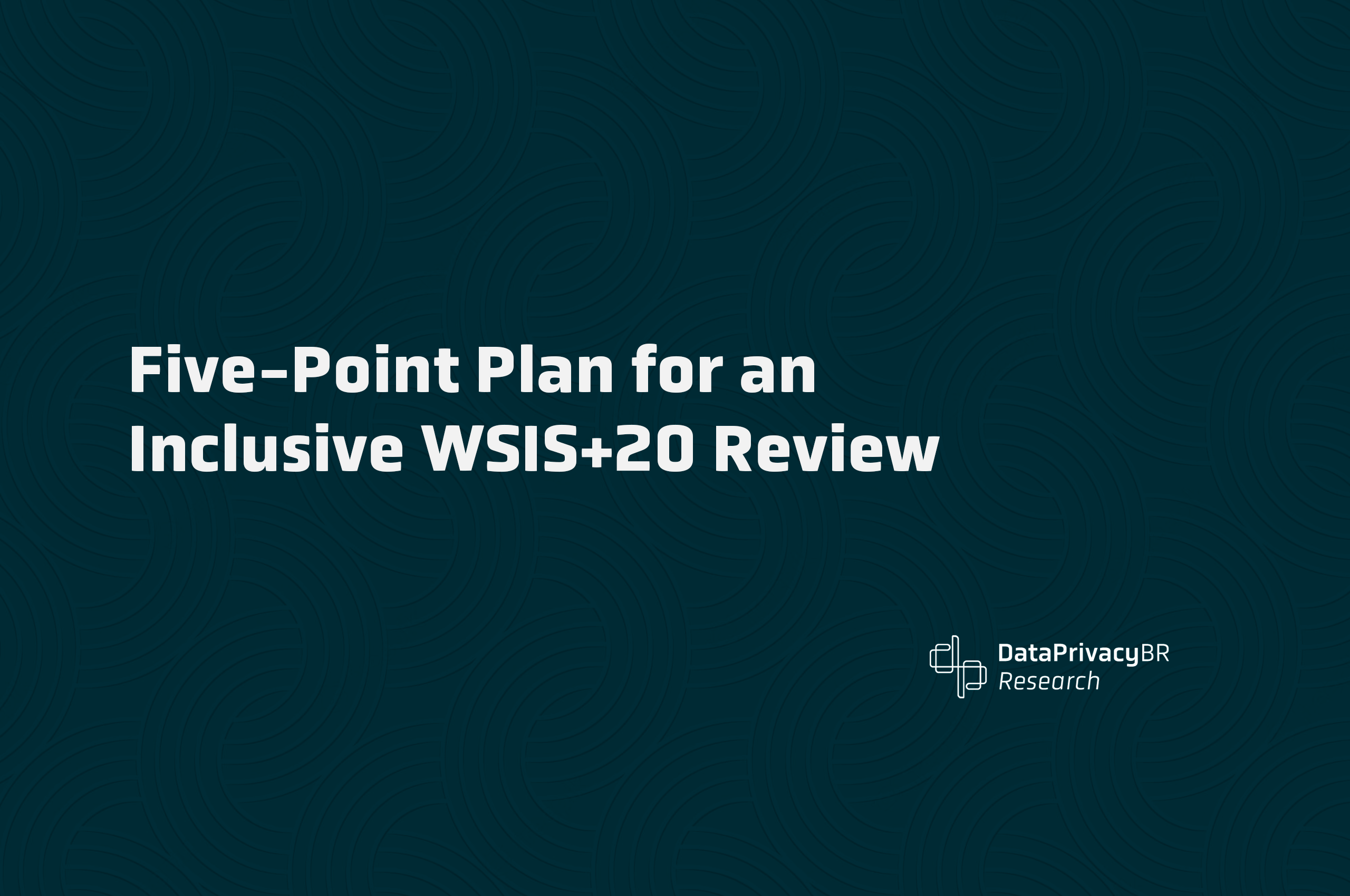Five-Point Plan for an Inclusive WSIS+20 Review
As stakeholders engaged in the WSIS+20 Review process, organizations sign the petition presenting recommendations to help operationalize the WSIS+20 review modalities in order to ensure transparency, inclusion, and meaningful stakeholder engagement.
As engaged stakeholders in the WSIS+20 Review process, we, the undersigned, submit the following recommendations
[1] [1] These draw on existing guidance on multistakeholderism, e.g. São Paulo Multistakeholder Guidelines.to help operationalise the WSIS+20 review modalities to ensure transparency, inclusivity, and meaningful stakeholder engagement.
Publish a Clear and Inclusive Timeline:
- Within 7 days of appointing the co-facilitators, publish and maintain a comprehensive timeline outlining key milestones, including consultations and government-only negotiations, with adequate notice of any changes.
- Provide stakeholders with at least 7 days to submit written input.
Ensure Transparency and Accountability:
- Maintain an online platform
[2]
[2]
For example, see this OHCHR platform.
centralizing all input and draft documents, their status, and stakeholders consulted.
- Publish substantive records of all consultations, including summary reports of main points and how these have been addressed, to enhance explainability.
- Live-stream government-only negotiations
[3]
[3]
For example, see recent negotiations on the UN Convention on Cybercrime.
and provide post-session transcripts.
Facilitate Inclusive and Meaningful Stakeholder Consultations:
- Actively seek stakeholder input at every stage (elements paper, zero / first / final drafts) through written submissions and official virtual/in-person consultations, applying equal participation rules for governments and other stakeholders.
- Hold official stakeholder consultations at existing forums, including global and regional IGF initiatives and the WSIS High-Level Event, while also inviting Member States to conduct national consultations.
- Implement a multistakeholder speaking order during consultations by alternating speaking slots among governments and other stakeholder groups, with reasonable time allocation for interventions.
Broaden and Diversify Participation:
- Build on the WSIS+10 accreditation process, including by broadening the group of eligible stakeholders to participants of national, regional, and global IGFs.
- Promote diverse participation by offering financial and logistical support for underrepresented communities, particularly from the Global Majority.
- Ensure accessibility globally by implementing measures such as accommodating different time zones and working days, publishing key documents in official UN languages, and providing low-bandwidth participation options.
Maximise Inclusive Participation in Final Negotiations:
- Limit any necessary closed-door intergovernmental negotiations to the final stage of the WSIS+20 process.
- Ensure meaningful and inclusive multistakeholder participation at the High-Level Meeting.
List of endorsing organisations:
- .au Domain Administration Limited (auDA), technical community, Australia
- .Daily Nawa-I-Ahmedpur Sharqia, Pakistan
- .hn – Red de Desarrollo Sostenible Honduras (NIC.HN) – ccTLD HN
- Access Now
- ACLIS, Burundi and Rwanda
- Africa Gen AI Lab
- Africa ICT Alliance (AfICTA)
- Alfa-Redi
- ARTICLE 19
- Asia Pacific Network Information Centre (APNIC)
- Asian Social Science Research Institute (Asri), Republic of Korea
- Asociación SVNet (SV Top Level Domain)
- Association for Progressive Communications (APC)
- Association of Freelance Journalists
- Bangladesh NGOs Network for Radio and Communication (BNNRC)
- Bolo Bhi (Pakistan)
- Canadian Internet Registration Authority (CIRA)
- Center for Democracy & Technology
- Center for Studies of Freedom of Expression (CELE)
- Collaboration on International ICT Policy for East and Southern Africa (CIPESA)
- Colnodo
- Computer & Communications Industry Association
- Comunitatea Internet Association, Moldova
- Cooperativa Sulá Batsú Costa Rica
- Council of European National Top-Level Domain Registries (CENTR)
- COYEDI, Burundi
- CyberPeace Institute
- Data Privacy Brasil
- DENIC eG, Technical Community, Germany
- Derechos Digitales
- Digital Action
- Digital Empowerment Foundation
- Digital Rights Foundation
- Digital Rights Nepal
- DigitalSENSE Africa
- DNS Africa Media and Communications
- DotAsia Organisation, Technical Community, APAC
- eco – Association of the Internet Industry
- EngageMedia Collective
- European Center for Not-For-Profit Law Stichting (ECNL)
- Feminist AI Research Network
- Global Forum for Media Development (GFMD)
- Global Network Initiative (GNI)
- Global Partners Digital (GPD)
- Hashtag Generation
- House of Africa, Chad
- Huaira Foundation Ecuador
- ICC BASIS
- Identity Digital
- IFEX
- Institute for Policy and Legislative Research (IPLR), Republic of Korea
- Instituto de Estudios Internacionales, Universidad de Chile
- Instituto para la Sociedad de la Información y Cuarta Revolución Industrial (Universidad La Salle, Perú)
- International Center for Not-for-Profit Law (ICNL)
- Internet Australia
- Internet New Zealand Incorporated (InternetNZ), technical community, New Zealand
- Internet Society
- Internet Society Argentina Chapter
- Internet Society Belgrade, Serbia Chapter
- Internet Society Brazil Chapter
- Internet Society Chad Chapter (ISOC-TCHAD)
- Internet Society Comoros Chapter
- Internet Society Costa Rica Chapter
- Internet Society Dominican Republic Chapter (isoc-do)
- Internet Society Ecuador Chapter
- Internet Society El Salvador Chapter
- Internet Society Ethiopia Chapter
- Internet Society Gender Standing Group
- Internet Society German Chapter (ISOC.DE e.V.)
- Internet Society Malawi Chapter
- Internet Society Nepal Chapter
- Internet Society, Nigeria Chapter
- Internet Society Philippines Chapter
- Internet Society Pakistan Islamabad Chapter
- Internet Society Puerto Rico Chapter
- Internet Society Singapore Chapter
- Internet Society UK England Chapter
- Intervozes – Coletivo Brasil de Comunicação Social
- Japan Registry Services Co., Ltd. (JPRS)
- KICTANet
- Media Matters for Democracy, Pakistan
- Media Monitoring Africa
- NetMission.Asia
- Paradigm Initiative (PIN)
- Pastoralist Girls Foundation
- Public Interest Registry (PIR)
- Puerto Rico Top Level Domain (NIC.pr)
- Research ICT Africa
- RNW Media
- Rudi International
- Rural Media Network Pakistan
- Software Freedom Law Center India (SFLC.IN)
- SMEX
- Taiwan Network Information Center (TWNIC)
- Tech for Good Asia
- Tech Global Institute
- Tech4Peace
- TEDIC Paraguay
- Telecommunities Canada (tc.ca)
- The Korea Game Users Association, Republic of Korea
- Tierra Común Network
- Transformative Legal Policy Research Center [TLPR], Republic of Korea
- Usuarios Digitales Ecuador
- Virtual School on Internet Governance (VSIG)
- Wikimedia Foundation
- Wikimedia Germany
- Women of Uganda Network (WOUGNET)
- World Association for Christian Communication (WACC)
- Youth Internet Governance Forum Canada (Youth IGF Canada)
Veja também
-
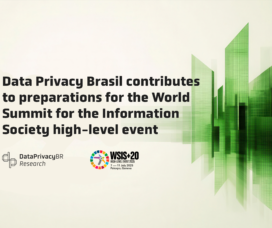
Data Privacy Brasil contributes to preparations for the World Summit for the Information Society high-level event
The event, which is co-organized by the ITU, UNESCO, UNDP, and UNCTAD, takes place in July, and this March, stakeholders were able to send their suggestions regarding the format and content to be debated, especially in light of the review process.
-
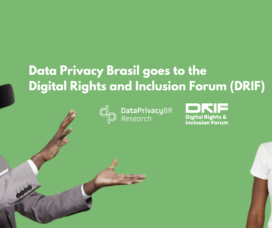
Data Privacy Brasil goes to the Digital Rights and Inclusion Forum (DRIF)
For the third consecutive year, Data Privacy Brasil will participate in the Digital Rights and Inclusion Forum (DRIF). DRIF – formerly known as the Internet Freedom Forum (IFF) – is an annual forum organized by Paradigm Initiative (PIN), since 2013, to be a space for discussions on global issues related to digital rights and inclusion.
-
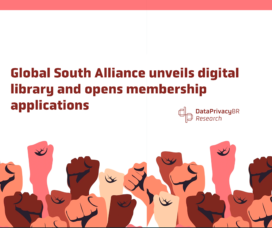
Global South Alliance unveils digital library and opens membership applications
The GSA invites organizations to express their interest in joining the network by completing the application form available until April 24.
-
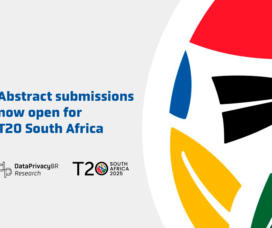
Abstract submissions now open for T20 South Africa
The Think20 South Africa invites researchers from around the world to contribute to a dynamic exchange of ideas on today's most pertinent challenges. The deadline for submitting abstracts is February 10, 2025.
-
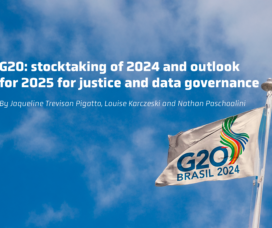
G20: stocktaking of 2024 and outlook for 2025 for justice and data governance
In 2024, Data Privacy Brasil took on a new and exciting challenge: participating in the G20 ecosystem, during the Brazilian presidency, through the official engagement group for think tanks, Think 20 (T20). Check out the text to learn more about Data's work at the G20.
-
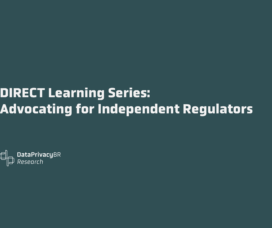
DIRECT Learning Series: Advocating for Independent Regulators
The 6th workshop took place on November 6th, 2024, in the context of the Data Rights and Enforcement through Community Trust (DIRECT) Learning Series, an ongoing thematic series of workshops with members of the DIRECT consortium, supported by Internews.
-

Exploring Opportunities in the Digital Economy and AI at the G20
The task force 5 of T20 Brasil has engaged several international think tanks to provide ideas and policy proposals on crucial areas of technological development, such as AI and Digital Public Infrastructures. This includes encouraging G20 nations to adopt policies that protect individual rights while fostering innovation.
Veja Também
-

Data Privacy Brasil contributes to preparations for the World Summit for the Information Society high-level event
The event, which is co-organized by the ITU, UNESCO, UNDP, and UNCTAD, takes place in July, and this March, stakeholders were able to send their suggestions regarding the format and content to be debated, especially in light of the review process.
-

Global South Alliance unveils digital library and opens membership applications
The GSA invites organizations to express their interest in joining the network by completing the application form available until April 24.
-

Abstract submissions now open for T20 South Africa
The Think20 South Africa invites researchers from around the world to contribute to a dynamic exchange of ideas on today's most pertinent challenges. The deadline for submitting abstracts is February 10, 2025.
-

G20: stocktaking of 2024 and outlook for 2025 for justice and data governance
In 2024, Data Privacy Brasil took on a new and exciting challenge: participating in the G20 ecosystem, during the Brazilian presidency, through the official engagement group for think tanks, Think 20 (T20). Check out the text to learn more about Data's work at the G20.
-

DIRECT Learning Series: Advocating for Independent Regulators
The 6th workshop took place on November 6th, 2024, in the context of the Data Rights and Enforcement through Community Trust (DIRECT) Learning Series, an ongoing thematic series of workshops with members of the DIRECT consortium, supported by Internews.
-

Exploring Opportunities in the Digital Economy and AI at the G20
The task force 5 of T20 Brasil has engaged several international think tanks to provide ideas and policy proposals on crucial areas of technological development, such as AI and Digital Public Infrastructures. This includes encouraging G20 nations to adopt policies that protect individual rights while fostering innovation.
-
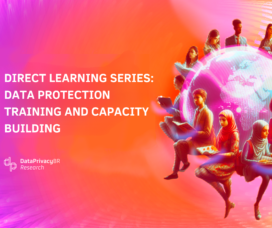
DIRECT Learning Series: data protection training and capacity building
The 5th workshop took place on October 2nd, 2024, in the context of the Data Rights and Enforcement through Community Trust (DIRECT) Learning Series, an ongoing thematic series of workshops with members of the DIRECT consortium, supported by Internews.
-
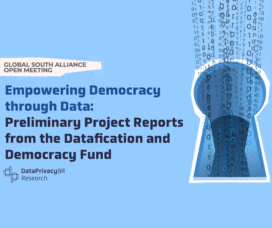
Empowering Democracy through Data: preliminary project reports from the DDF
The Global South Alliance wil host its next open meeting on October 22, 2024, where grantees from the first cohort of the Datafication and Democracy Fund (DDF) will present their impactful research.
-
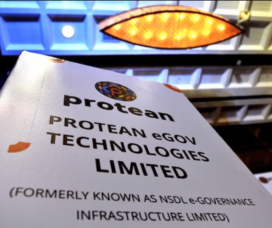
Protean acknowledged for leadership in digital public infrastructure
A report from Data Privacy Brasil underscores how DPI can be leveraged to create environments where data privacy and security are prioritized.
-
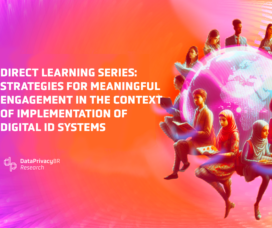
DIRECT Learning Series: strategies for meaningful engagement in the context of implementation of Digital ID systems
This workshop took place on August 28th, 2024, in the context of the Data Rights and Enforcement through Community Trust (DIRECT) Learning Series, an ongoing thematic series of workshops with members of the DIRECT consortium, supported by Internews.
-
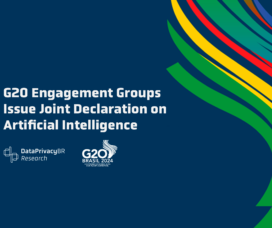
G20 Engagement Groups Issue Joint Declaration on Artificial Intelligence
On Tuesday (10), the main G20 engagement groups, including Civil 20 (C20), Labor 20 (L20), Think 20 (T20) and Women 20 (W20), announced a groundbreaking joint statement on the ethical, sustainable and inclusive development and deployment of artificial intelligence (AI).
-
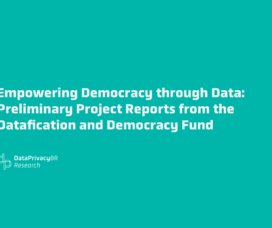
Empowering Democracy through Data: Preliminary Project Reports from the Datafication and Democracy Fund
The Global South Alliance held its first meeting with the organizations covered by the Datafication and Democracy Fund. On the occasion, each of the five organizations - Like a Palm Tree (Africa), Center of Security and Citizenship Studies (LatAm), Corporación Cambio Sostenible (LatAm), Criminal Justice & Policy Accountability Project (India), and Ikigai Innovation Initiative (Africa) - had the opportunity to present the preliminary results of their projects and hear feedbacks from the GSA members.
-
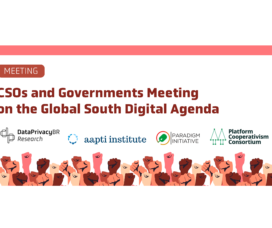
CSOs and Governments Meeting on the Global South Digital Agenda
On September 21st and 24th, the event “Open Dialogue: Global South Alliance and Governments for an Inclusive Digital Agenda” will take place, promoted by the organizations Data Privacy Brasil, Aapti Institute, Paradigm Initiative and PCC (The New School). The event aims to provide an open conversation with diplomats about the international agenda for IPRs, AI, GDC implementation and G20 continuity.
-
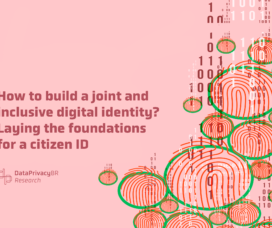
How to build a joint and inclusive digital identity? Laying the foundations for a citizen ID
Do you know what an identity is? Thinking about facilitating access to the topic, Data Privacy Brasil has developed a series of content to provide the foundations and tools possible for all the details on the subject. With this, we will be able to discuss, as a community, what we want with a digital identity and how we can achieve it.
-
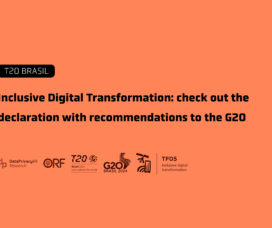
Inclusive Digital Transformation: check out the declaration with recommendations to the G20
In the document, six priorities were defined to deal with issues such as digital inclusion and meaningful universal connectivity; and challenges, opportunities and governance of artificial intelligence.
-
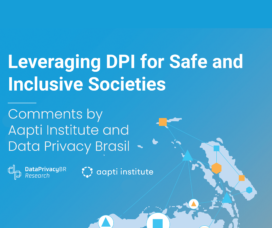
Leveraging DPI for Safe and Inclusive Societies
Aapti and Data Privacy Brasil have submitted their contribution to the Office of the United Nations Secretary-General's Envoy on Technology (OSET) and the United Nations Development Programme (UNDP) regarding the report "Leveraging DPI for Safe and Inclusive Societies".
-
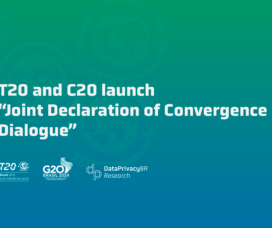
T20 and C20 launch “Joint Declaration of Convergence Dialogue”
On the 2nd and 3rd of July, a Mid-Term Conference took place in Rio de Janeiro, a T20 event with the participation of leaders from national and international think tanks, members of academia, representatives of the private and public sectors and civil society to discuss and propose solutions to the main global challenges.
-

Datafication and Democracy Fund welcomes five organizations from the Global South for short-term projects
The Datafication and Democracy Fund Committee, composed of Data Privacy Brasil, Paradigm Initiative, and Aapti Institute, is pleased to announce the five organizations awarded funding for a short-term research project.
-
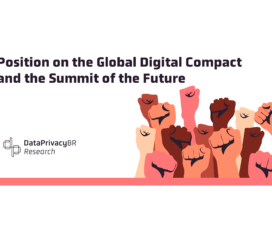
Position on the Global Digital Compact and the Summit of the Future
Between the 9th and 10th of May, the UN Civil Society Conference is happening in Nairobi. The event is presented as an opportunity to engage civil society in preliminary discussions ahead of the Summit of the Future.
-
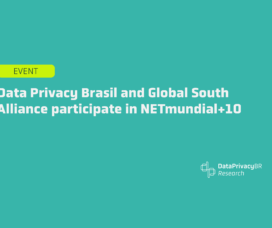
Data Privacy Brasil and Global South Alliance participate in NETmundial+10
Between April 29th and 30th, the NETmundial+10 took place in São Paulo. Building upon the event and the NETmundial Declaration of 2014, this event focused on strengthening global multistakeholder governance for the Internet and digital technologies, as well as conveying messages to global actors for better coordination of various ongoing processes.
-
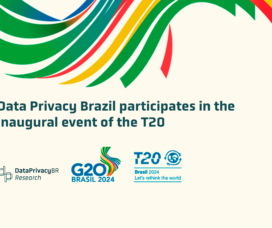
Data Privacy Brazil participates in the inaugural event of the T20
Between March 4th and 6th, the Organizing Committee of T20 Brazil - composed of CEBRI, FUNAG, and IPEA - held the first official event of the engagement group. The event took place entirely virtually and was openly broadcast to the public.
-

Inclusive Digital Transformation in the T20
The year 2024 marks Brazil's presidency in the G20, the group of the world's largest economies, chaired by our country for the first time. It is a year of great opportunity for Brazil to influence a broad global governance agenda, prioritizing issues such as inequality, climate change, and, of course, digital transformations.
-
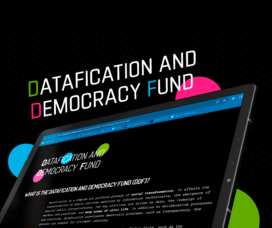
Data Privacy Brasil, Paradigm Initiative and Aapti Institute announce the launch of the “Datafication and Democracy Fund”
The fund aims to finance activities that strengthen the work of NGOs in the Global South on issues of datafication and democracy
-
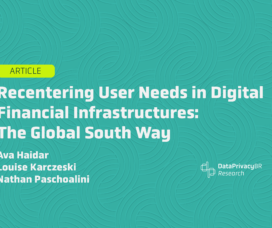
Recentering User Needs in Digital Financial Infrastructures: The Global South Way
Through India’s G20 leadership in 2023, global agendas of digital transformation and financial growth have come to be intimately reoriented to challenges, priorities and special developments in the Global South.
-

At UNCTAD eWeek, Data Privacy Brasil will discuss the intersection between digital economy and human rights in AI regulation
The UNCTAD eWeek, an initiative of the United Nations Conference on Trade and Development (UNCTAD) in partnership with eTrade for all, will occur from the 4th until the 8th of December.
-
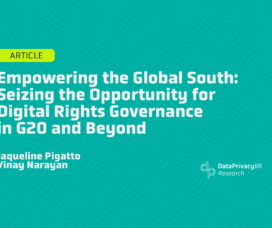
Empowering the Global South: Seizing the Opportunity for Digital Rights Governance in G20 and Beyond
The G20 represents a critical policy space for addressing emergent challenges on a global scale and its importance as a platform is pronounced when we consider its significance for the Global South.
-
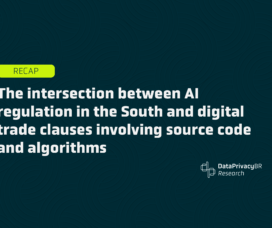
The intersection between AI regulation in the South and digital trade clauses involving source code and algorithms
Recap of Session 43 of the WTO’s 2023 Public Forum organized by Data Privacy Brasil and REBRIP
-
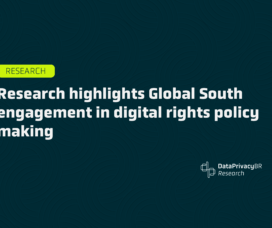
Research highlights Global South engagement in digital rights policy making
The Data Privacy Brasil Research Association announces the launch of the research report on Global South perspectives on international engagement in digital rights.
-
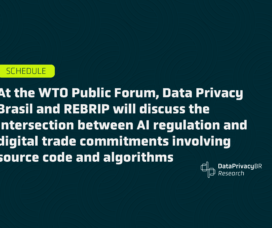
At the WTO Public Forum, Data Privacy Brasil and REBRIP will discuss the intersection between AI regulation and digital trade commitments involving source code and algorithms.
The WTO Public Forum 2023 will take place between September 12th and 15th in Geneva.
-
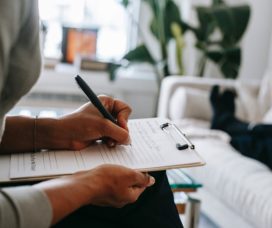
Data Privacy Brasil’s contribution to the Thematic Deep Dive of Artificial Intelligence and other Emerging Technologies of the Global Digital Compact
As other civil society organizations already pointed out, notable preference was given to the speech of Member States, UN agencies, and the private sector, at the expense of human rights civil society organizations, which prevented the speech that had been prepared by the DBPR and other civil society stakeholders.
-
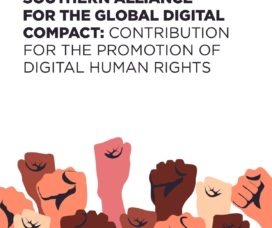
Southern Alliance for the Global Digital Compact
Responding to the call made by the United Nations, the Data Privacy Brazil Research Association, together with organizations from the Global South, presents a contribution to the Global Digital Compact.
-
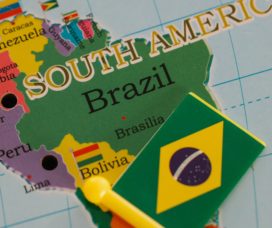
Data Privacy Brasil Research Association contributes to UN open call on the relationship between human rights and technical standard-setting processes
We received a call as an opportunity to submit suggestions to inform the OHCHR report on the relationship between human rights and standard-setting processes for new and emerging digital technologies.
-
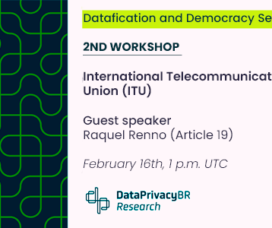
Our second workshop of a series about technical forum talks about the International Telecommunications Union
In the second meeting of the Datafication and Democracy Workshop Series, we received Raquel Renno, Digital Programme Officer of Article 19, who spoke about the International Telecommunication Union (ITU) for third sector organizations.
-
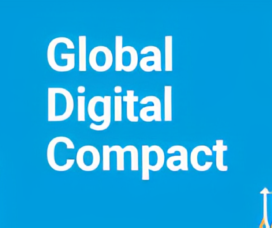
Let’s stay tuned for the Global Digital Compact
What is the Global Digital Compact and why is it important to keep an eye on it?
-
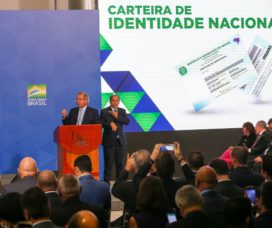
Why should we all pay attention to the Brazilian Digital ID system?
The implementation of digital identity systems is increasing around the world, especially in Global Southern countries. The model widely adopted is known as Big ID, promoted by or linked to public administration bodies which use centralized biometric databases to identify and authenticate citizens (Access Now, 2021).
DataPrivacyBr Research | Content under licensing CC BY-SA 4.0

